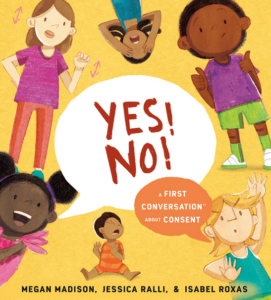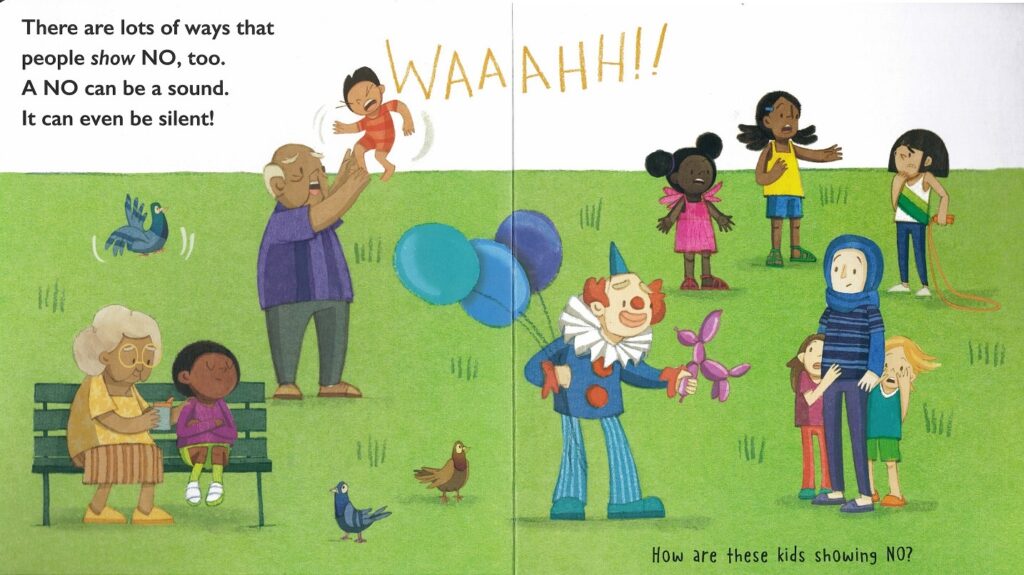Reviewed by Makai Kellogg
Review Source: Teaching for Change
Book Author: Megan Madison, Jessica Ralli
Consent is a big deal for my three to five-year-old students. As a population who navigates their days around people who exert power — both peers and adults — conversations about consent are critical for building a safe classroom environment. Expressing one’s feelings, understanding other perspectives and standing up for oneself are par for the course in an early childhood classroom.
While planning Black Lives Matter at School Week of Action, I like to include a day that focuses on the Black Lives Matter guiding principles of empathy, loving engagement, and restorative justice. This year, we explored the theme of consent with the newly released Yes! No!: A First Conversation About Consent.
Megan Madison and Jessica Ralli, authors of Our Skin: A First Conversation About Race and Being You: A First Conversation About Gender, with illustrator Isabel Roxas, have created another remarkable book that addresses a big idea that young children, older children, and adults grapple with on a daily basis. Even before the main content begins, the authors encourage the reader to ask the child, “Do you want to read this book with me?”
Roxas’ drawings depict scenarios where consent comes up in many real life contexts and portray thoughtful, relevant interactions. The illustrations engage the reader in interpreting facial cues and body language, especially on the pages that provide examples of how “no” can be expressed nonverbally and when a “yes” can change to a “no.”
As a parent of a 2.5 year old, I hear “stop, no, my body” maybe a hundred times a day. Sometimes my child is asserting herself against unwanted touch, advocating that she do something herself, or refusing to follow a routine transition. Yes! No! serves as a reminder to look and listen for the wants and needs of others, of the ways one can model respect and show empathy, and to reflect on how we are fostering children’s development of healthy boundaries. The book implores adults to rethink our interventions with children’s choices; are our intentions rooted in health and safety concerns or as a means to overpower or demand obedience?
While reading to my students, the book guided us through bodily autonomy, the role of adults, what “no” can look like, and how to convey consent. Here are some of the children’s responses to prompts in the book:
What body parts do you know?
E: Hand and arm
O: Head
L: Belly button
S: Toes
What are some things you like to do with your body?
N: I like to play and exercise
O: I like to play being Simba and Nala
L: I do gymnastics and ballet
What are some choices that grown-ups make for you and your body?
N: My parents don’t always say “yes” to what I want to do
S: My mom tells me to wake up quicker, but I’m a heavy sleeper
Do you ever like hugs? When do you like hugs?
N: I only like hugs from mommy and daddy all the time
E: I like hugs all the time
L: I like hugs all the time
How are these kids showing NO?
N: If I don’t want to say no, I can just sign “n” “o”
O: He’s “no” because they are scared because of the clown (hiding behind someone)
A: No drink (child turning head away) and he don’t like heights (baby screaming)
S: He’s crossing his arms like I do sometimes
What helps you feel better when your feelings are hurt?
O: Go to a teacher and tell them what happened
Since the first reading, I’ve referred back to specific pages based on similar experiences with students, for example, the feelings that arise when someone says “no” to you. My students also made connections to Yes! No! when we read Don’t Touch My Hair!
At any age, asking permission, listening to others’ words, and repairing harm communicate empathy, loving engagement, and restorative justice. Yes! No!: A First Conversation About Consent provides clear explanations of the many puzzle pieces that fit under the umbrella of consent that incorporates the reader’s experiences and understanding, as well. The end of the book provides valuable information to adults on the main themes woven throughout, such as bodily autonomy, body vocabulary, the joy of pleasure, power, adultism, affirmative consent, boundaries, feelings, and empathy.
I recommend this book as a tool to cultivate a culture of consent in the classroom and at home.
Makai Kellogg is an anti-bias early childhood educator and Equity and Diversity Coordinator at School for Friends in Washington, D.C. Makai creates age-appropriate curriculum on social justice for her students to explore equity issues, such as race, homelessness, gender stereotypes, etc. Makai leads the Parents of Multiracial Children group, Equity and Diversity Parent Book Club, as well as other programming throughout the year that allow parents to address their biases to be proactive as their children learn about the world around them. Makai facilitates training and opportunities for her colleagues to engage in identity work and discussions on equity and anti-bias education in the classroom. Through her work with young children and their families, she is creating an inclusive community of critical thinkers and change makers. Makai works closely with Teaching for Change and its initiative, the D.C. Area Educators for Social Justice, as an advisory board member. She is also part of the leadership team for the Anti-Bias Early Childhood Educator Working Group. Makai writes about her equity endeavors on her blog.
Find more board books in the First Conversation Board Book Series.
See more recommended Board Books.

Yes! No!: A First Conversation About Consent by Megan Madison, Jessica Ralli
Published by Penguin on February 1, 2022
Genres: Early Childhood Anti-Bias
Pages: 36
Reading Level: Early Childhood
ISBN: 9780593386620
Review Source: Teaching for Change
Also by this author: Our Skin: A First Conversation About Race, We Care: A First Conversation About Justice, We Care: A First Conversation About Justice
Publisher's Synopsis: A board book bestseller – Developed by experts in the fields of early childhood development and activism against injustice, this topic-driven book offers clear, concrete language and imagery to introduce the concept of consent. This book serves to normalize and celebrate the experience of asking for and being asked for permission to do something involving one's body. It centers on respect for bodily autonomy, and reviews the many ways that one can say or indicate "No." While young children are avid observers and questioners of their world, adults often shut down or postpone conversations on complicated topics because it's hard to know where to begin. Research shows that talking about issues like race, gender, and our bodies from the age of two not only helps children understand what they see, but also increases self-awareness, self-esteem, and allows them to recognize and confront things that are unfair, like discrimination and prejudice. These books offer a supportive approach that considers both the child and the adult. Illustrative art accompanies the simple and interactive text, and the backmatter offers additional resources and ideas for extending this discussion.


Leave a Reply